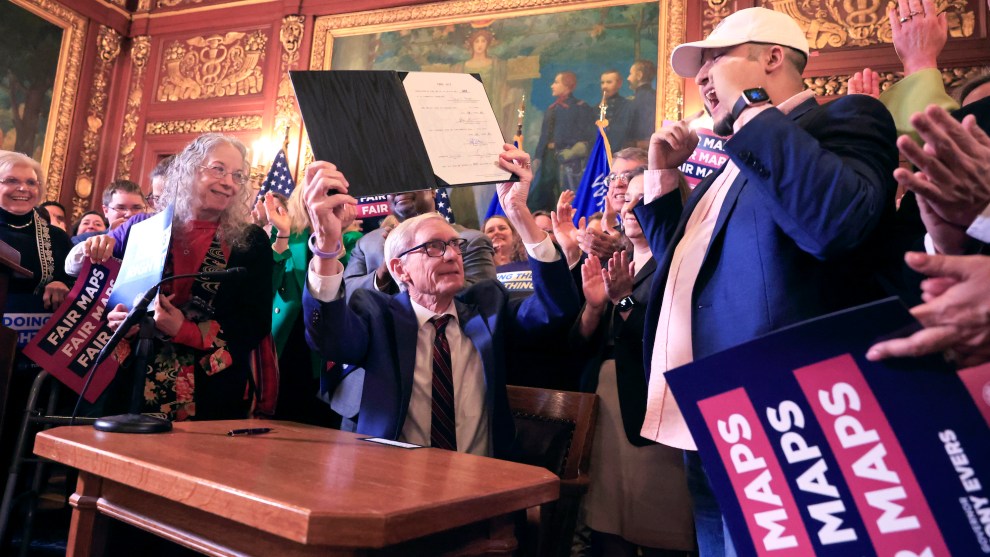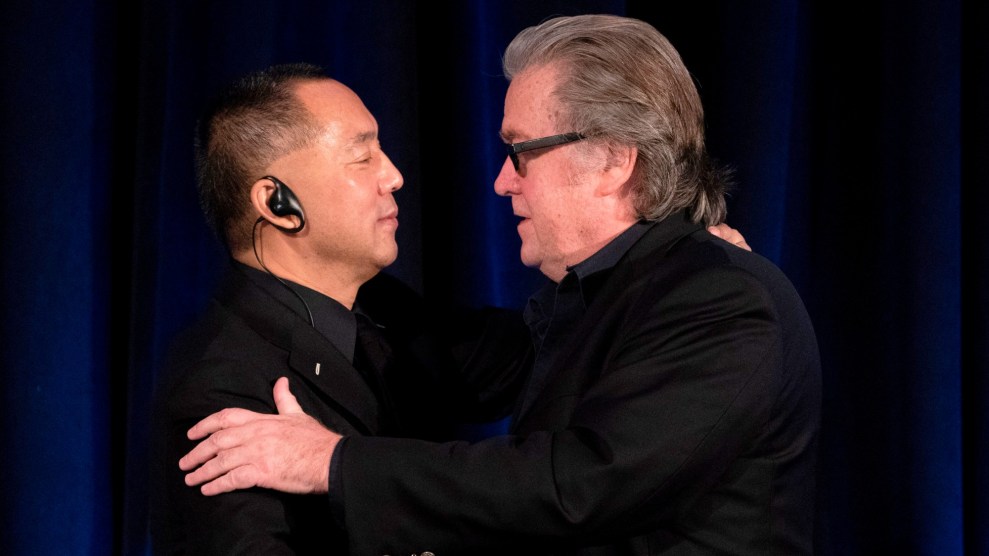
Mother Jones; Macmillan; Nabil K. Mark/Centre Daily Times/AP
It’s been said so often it’s almost become a cliché: Donald Trump poses a threat to American democracy. But his authoritarian impulses and hate-encouraging demagoguery are far from the only peril for the nation. Conservatives and Republicans for years have been striving on multiple fronts to weaken democracy by suppressing voter rights and pushing for other measures—such as gerrymandering and placing election boards under partisan control—that undermine majority rule.
No journalist has been a better chronicler of this nefarious crusade than Ari Berman, the national voting rights correspondent at Mother Jones. Berman, a longtime colleague of mine, has a new book out this coming week that covers the many schemes and plots waged by the right wing to subvert democratic institutions and skew elections in the favor of Republicans: Minority Rule: The Right-Wing Attack on the Will of the People—and the Fight to Resist It. The goal is simple: to amass political power for the GOP, as the party faces demographic shifts that will relegate it to minority status. To achieve this end, the Republican Party and its allies within the conservative movement are rigging the system.
With this valuable and important book, Berman exposes all the skullduggery and shenanigans of the right that endanger democracy. A few days ago, Berman and I chatted about his efforts to shine a light on the GOP war on America.
In the first issue of this newsletter, I wrote that Republicans were pushing for “political apartheid”—that is, minority rule. In your new book, you write that “the central threat now facing American democracy is minority rule.” As many of us know, from the start, there have been institutional features of our constitutional system that bolster minority rule. Then there are measures that Republicans have been trying to implement in recent years to deepen minority rule. Can you give us a rundown on both?
There’s this framework that dates to the founders, who, despite their revolutionary rhetoric, didn’t want to create institutions that were all that democratic. A lot of institutions created by the founders were meant to constrain democracy. Even as they’ve been democratized, you have a situation in which someone can win the popular vote but lose the Electoral College. And each state gets the same number of senators. Wyoming has dramatically more representation in the Senate than California, which violates the principle of one person/one vote. And the Supreme Court is a product of these two skewed institutions. You also did not have voting rights for all. All of these anti-democratic measures were built into the system. Then you have new forms of anti-democratic tactics—like voter suppression and gerrymandering—that are layered on top of this anti-democratic foundation to entrench the power of a conservative white minority.
You write that the founders put “a ticking time bomb” into our democracy. What do you mean by that?
They created institutions that allowed a minority of the population to control a majority of political power. That idea is directly at odds with the idea that a democracy should be based on the consent of the governed, as laid out in the Declaration of Independence. This is deeply destabilizing because every four years, for example, with the Electoral College, the majority can vote one way, and the minority can vote the other way and still manage to take power. These things are becoming increasingly explosive because in Donald Trump you have an authoritarian leader trying to take advantage of them.
In terms of the ticking time bomb metaphor, you mentioned how the small rural states have disproportionate power. That might have made sense at the time when the largest of the 13 original states was only so much bigger than the smallest. But as we’ve grown as a nation, the disparity has become gigantic. Eventually, you’ll have a handful of small states having so much more power than the more populous states.
In 1790, the country’s largest state, Virginia, had 12 times the population of the smallest state, Delaware. Today, California, the largest state, has 67 times the population of the country’s smallest state by population, Wyoming. Conservatives love to quote the founders and say this is what they intended. But the architect of the Constitution, James Madison, hated the idea that every state got two Senate seats. He said it was going to allow a trifling minority to control the Senate. That’s what’s been happening. By 2040, roughly 70 percent of Americans will live in 15 states with 30 senators. That means that 30 percent of America is going to elect 70 senators. The Senate, based on how it is set up, guarantees minority rule.
One thing that caught my attention in the book is that just a very small cadre of right-wing activists are orchestrating this assault on democracy.
This crystallized after the 2010 election, when Republicans flipped the legislatures in key swing states, and then they gerrymandered to maintain power for the next decade and beyond. There was a small circle of anti-democratic activists who predated Trump and who radicalized the Republican Party before Trump, and they wanted the Republican Party to be defined by restricting voting rights and extreme gerrymandering. The election of Barack Obama in 2008 was the tipping point where Republicans saw the changing demographics of the country working against them. And they said, we need to do something to make sure that these changing demographics don’t yield a new political majority and drive our party, a largely white party, into extinction. I think that’s what pushed the Republican Party into a more anti-democratic direction.
What are the most egregious and outrageous anti-democracy laws and rules that have been recently enacted or that are in the works?
God, there’s so many. The Texas legislature last year passed a law that gave the GOP secretary of state the power to take over elections only in one county in the state—in Harris County, one of the most Democratic counties in the state, which includes Houston. They said, we’re only going after this one county. North Carolina Republicans passed a law that took away the ability of the state’s Democratic governor to appoint a majority of the members of county election boards. These boards decide things like early voting. They could decide that instead of 20 early voting sites, there will only be one in a huge urban county. They also took the power to certify elections away from those boards and gave it to the Republican-controlled legislature. If they don’t like the fact that Joe Biden wins the state, they could try to overturn that result. Voter suppression has always been there for Republicans, but now they’re layering elections administration on top of voter suppression. They’re trying to suppress votes on the front end. But if that doesn’t work, they’re going to do it on the back end.
Let’s turn to voter ID laws and let me be a devil’s advocate. For many, it may sound reasonable that people should have to show official ID when they vote—a driver’s license or some other government-issued ID—like you need to get on a plane. What’s the problem with these laws?
It seems reasonable. But if you dig deeper on the numbers, it impacts some communities more than others based on how the laws are written and implemented. For example, there’s a law in Texas that allows you to vote with a gun permit, but not a student ID. That clearly seems targeted at some people more than others. Alabama passed a voter ID law, and it closed DMV offices in the majority of the counties where the majority of the Black population lives. So the place where you would go to get the ID no longer exists in these counties.
For 90 percent of the public, voter ID is not a big issue. But for the 10 percent of the public that may not for one reason or another have this ID, it can be burdensome. And then you need underlying documents like a birth certificate to get that ID. That requires money and time. Texas closed a third of DMV offices after they passed a voter ID law. Some people have to travel 200 miles or more just to get to a local DMV.
Republicans make it seem like it’s all about voter ID. But there are other things they’re trying to do. They’re attempting to cut early voting. They’re trying to eliminate Election Day registration, purge people from the voting rolls, and close polling places. This isn’t just about requiring a form of identification. This is about changing all sorts of voting systems that appear to benefit one party over the other.
Are President Joe Biden and the Democrats doing enough to identify and counter these threats to democracy?
The Democratic Party has become more aggressive about countering these threats to democracy, but the Democrats are not as pro-democracy as the Republicans are anti-democracy. There’s still asymmetric warfare going on. After the 2020 election, Republicans in every state legislature they controlled passed legislation to make it harder to vote. Democrats didn’t pass any legislation to protect voting rights. That was largely because two people on the Democratic side blocked it: Sens. Kyrsten Sinema and Joe Manchin. And Joe Biden was slow in embracing the cause of changing the filibuster to pass voting rights legislation. But Democrats have been more aggressive recently. Biden has made the preservation of democracy the centerpiece of his 2024 campaign. He’s tried to elevate this issue and often has been mocked for it, with a lot of pundits saying people don’t care about democracy. That clearly is not true based on how they voted in recent elections.
There’s a line that conservatives like to push: America is not a democracy, it’s a republic. You hear this repeatedly. Explain what they mean by this, and why they’re wrong.
You hear it from Republican Sen. Mike Lee and John Eastman, and all these people who were behind the insurrection, and conservative activist Cleta Mitchell—that America was never set up to be a democracy and was always supposed to be a republic. And that justifies them violating majority rule and pushing anti-democratic measures. I traced this idea back to the John Birch Society.
These were far-right kooks who believed that 70 percent of Americans were communists in 1959. They thought that there was a communist conspiracy that included President Dwight Eisenhower and that there were Russian weather machines.
And you couldn’t put fluoride in the water because it would poison you. They were influential in the ’50s and early ’60s. The John Birch Society pushed this idea that we were a republic not a democracy because that was their way to oppose the civil rights movement and the granting of new rights to formally disenfranchised communities. The founders didn’t want a direct democracy, like in ancient Greece, because they thought that direct democracy led to mob rule. But they wanted to create a representative democracy, in which you would have representatives who they believed would be wiser and more thoughtful and more careful and who would represent the views of their constituencies. The representative democracy the founders set up was very flawed. But the point is, they didn’t say we’re not a democracy. They said clearly that we’re a representative democracy. And it’s the representative part that is always missed by the people who say we’re not a democracy. But they invoke this mantra to justify all sorts of anti-democratic tactics.
Some right-wingers have recently even talked about getting rid of the direct election of US senators.
Yes, and there’s a Republican gubernatorial candidate in North Carolina saying women shouldn’t be able to vote. Trump created this climate with the insurrection and the effort to overturn the election, so anything goes now. What can you do that’s worse than try to overturn the election? If that becomes normalized, it’s a free-for-all in terms of anti-democratic action.
We used to think that making it harder for some people to vote was outrageous. But compare that to attacking the Capitol…
That’s what’s been so disturbing about the work I’m doing. I started as a journalist writing about barriers to the ballot box, and you’re talking about a few thousand people being prevented from voting. Then Trump shows up and tries to throw out 10 million votes in the 2020 election. When you think about it, the level of anti-democratic actions we have seen is way beyond what any of us could have imagined a few years ago.
What are your biggest worries for the 2024 election?
That the anti-democratic movement that was unsuccessful in 2020 will be successful in 2024. They are now more strategic, and they are now being helped by a political system that advantages more conservative and more rural areas as opposed to more urban, more diverse, and more progressive areas. I’m concerned about the toxic combination of an undemocratic political system and an authoritarian leader who wants to take advantage of that political system. I wonder whether our institutions will hold again. Are we a democracy if we’re only relying on one party to uphold democracy? That seems a dangerous situation. What if the only party that will uphold democracy becomes unpopular for any number of reasons?
A lot of people feel like we dodged a bullet in 2020. But the gun is being reloaded right now. The effort to overturn the election in 2020 was disorganized. The anti-democratic movement is now more organized. It has a leadership and marching orders and people at all levels. If they want to stage an insurrection, they could stage a much more organized insurrection the second time around.
Finally, you and I shared a small office a long time ago in Washington, DC, when we both worked for the Nation. Any stories about that you want to tell?
Here’s what I remember: You watching cable news constantly, every minute of the day on the tiniest TV that I’d ever seen. You talked to Mike Isikoff 16 times a day—
We were working on a book together—
Yeah, and you didn’t like me until you realized that I liked Wilco. Your attitude was, who’s this guy [Nation editor] Katrina vanden Heuvel sent down here? What’s he doing? And then you mentioned you were going to see Wilco, and I said, “I like Wilco.” And the next day, you said, “Sorry, I don’t have an extra ticket. But, you know, next time.” The fact that I liked Wilco, The Wire, and Curb Your Enthusiasm—that was enough to endear me to you eventually.
Well, those are all very important things and I stand by my decision.
You can read a wonderful excerpt of Berman’s compelling book here.
















